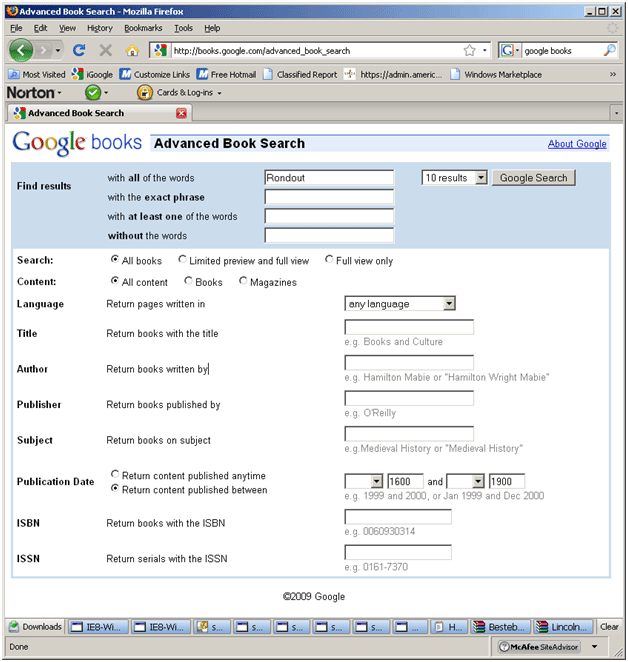Google Books: A Tool for Book Collectors
- by Bruce E. McKinney

Google Books Advanced Search
By Bruce McKinney
I'm using Google Books to identify additional early [or old if you prefer] material for the Rondout & Kingston Wiki Bibliography that I'm building on AE. The subject and purpose are unimportant. You can search for anything for any purpose; for research, collecting or whatever. I am hopeful of finding additional material to add to the one hundred eleven items I've already identified, and given the magnitude of books Google has now scanned - some 8 million and counting, I'm hopeful. I quickly realize though they have not been focusing this year on Rondout or on material that includes Rondout references in the text. I know this because the number of matches for this search has not materially changed from earlier this year. Nevertheless, there are enough references to make a close reading of the search results a worthwhile undertaking and confirm that Google Books is an extraordinary research tool. Many of the references will prove to be irrelevant but nowhere else on earth can you find this type of detail. It takes time to parse the multitude of references but it is worth the effort. There are, as of this writing, 1,085 references in the same text containing both Rondout and a date between 1600 and 1900. Compare that with Abe, 14; the American Antiquarian Society, 30, the Americana Exchange Bibliographic Database 32; and the Rondout-Kingston Wiki Bibliography, 111.
For this article I made a comparison of Google Books and Abe book listings as tools for discovering new material that include references within a narrow focus. Abebooks' database offers a hundred million items, and assuming a 150 word average listing, an instantaneous response within a search of 15 billion words. Google Books is already much larger. It today searches every word in 8 million books. That's probably 320 billion words more or less, more than twenty times the data Abe searches.
The search I'm running in the Advanced Search on both sites is simple, the term "Rondout" in the keyword field and various date ranges in the date fields. On AbeBooks I’ve been doing this type of search for years. It's very effective for identifying both primary and secondary material. When I run such searches on Abe, I sequence results in date posted order by selecting 'SORT RESULTS BY NEWEST'. In this way, before I get too far into the listings I usually recognize material from previous searches and stop there. Google lacks both this feature and its better alternative - 'search memory.' Given the scale of results it's almost an essential for searches that are updated every few months, to know when/where you left off.
So first I run the search on Abebooks and find nothing new. It is not surprising. I have made some great Rondout purchases over the years on Abe but there is nothing new of interest today. Fresh material appears randomly. I then switch to Google Books. It's easy to find. Just do a Google search for it by name: Google Books and then select Advanced Search.
Next I use Rondout as my search term in the title field and enter the date range 1600 to 1900. The results are both very fast and very thin; 39 records, many of them later. I then shift to the full text search and get buried in matches. Because Google Books matches both date range and terms anywhere in the full text of specific sources most references, it turns out, are to prior events rather than to original material. I can live with this because the detail is stunning.
Rondout's history emerges after 1750 but I start earlier because the second earliest known book auction in the colonies was held in Ulster County around 1665. There is a reference to it in Olde Ulster that Google Books hasn't yet found. I look just in case.